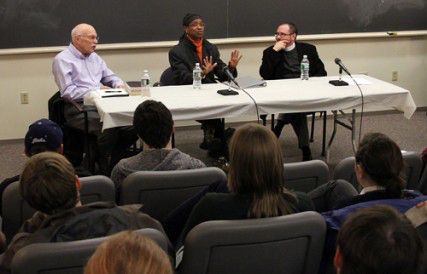
A student organizer of an LGBTQ event in the Sargent College of Health and Rehabilitation Sciences added some strong words to a growing national debate about homosexuality and religion in a Monday night event.
“A lot of people write off religion as the enemy, but it’s all about finding the right group or the affirming group,” said Arcangelo Cella, a College of Arts and Sciences freshman who helped sponsor the event. “Religion is not the enemy, ignorance is the enemy.”
Transgendered priest Cameron Partridge joined Richard Pillard, a Boston University professor of psychology, and Irene Monroe, a lesbian reverend and columnist, to speak to more than 60 students in the Sargent auditorium concerning ways the LGBTQ community can interact with religion.
Cella organized the debate with the help of chapel associate Liz Douglass.
“The speakers are really special in that they have done fundamentally important things for our community,” said CAS junior Kate Rodgers. “It’s especially important with such a wide diversity of people on the panel, for education purposes.”
Each speaker brought forth issues they said where often overlooked in U.S. society, even within the LGBT community.
Ten years ago, Partridge was studying at Harvard Divinity School to be ordained into their congregation. He became not only a priest and the Episcopal Chaplain at Harvard, but one of the few transgendered members of the congregation.
Partridge spoke about the rising prominence of transgender issues within the community and its acceptance in some congregations.
“It was not something I really understood, what I would need to do to be fully myself, until shortly before it happened,” Partridge said. “I was really fortunate to have and be in a place where I was able to talk to my bishop and have the kind of trust that would enable us to learn together.”
While Partridge acknowledged that many congregations around the country are not as accepting as his, he believes his story is not an anomaly.
“Not that there aren’t struggles, because there definitely are, but the relationship between religion and [LGBTQ people] is often portrayed in black in white…when it’s more complex than that,” Partridge said.
Some students said they found the discussion on transgendered people eye-opening.
“I had not given a lot of thought to transgender issues, compared to the others, unfortunately,” said CAS junior Rebekah Phillips. “I think it was important to hear about it.”
Monroe drew attention to the struggles LGBT people have within the black community. A former pastor for a black church in the Bronx, she said she noticed an extreme disconnect between two communities, as the
church there wrote off her homosexuality as a “white disease.”
“What’s very troubling about that is that given the civil rights movement, one would think that there is no better institution to be open and accepting other than the black church,” she said.
Monroe said the black community thought her sexual orientation was a contagion she received from being around white females at Wellesley College.
The problem, she said, was not her interaction with her peers, but the community’s overwhelming “hierarchy of oppression.”
To overcome this issue, she said the church must first realize that racial and sexual oppression are related and thereafter build communality.
Pillard said the idea of communality enabled him to co-found the Gay and Lesbian Counseling Service in 1971 – the first gay-positive mental health service.
An atheist, Pillard said he believes his humanist outlook paralleled his coming out.
“Anyone that belongs to a minority knows we are hated and particularly by orthodox religions,” Pillard said. “Why support religious institutions that so bitterly oppose the feelings that are most precious to you?”
“A lot of students study psych, but what about ‘gay psych?’” Cella asked. “The interest is there, but we wanted to make sure that these topics are addressed.”


















































































































